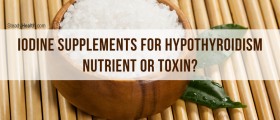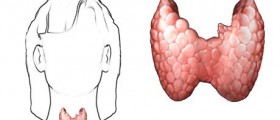
Iodine is very important in all stages of life, but it is particularly important for pregnant and lactating women and for children. However, even in countries that have iodized salt programs, meaning they fortify table salt for human consumption with iodine, the risk of iodine deficiency has increased.
Iodine deficiency
Iodine deficiency is considered to be a major health concern. It is one of the most important preventable causes of brain damage and it can cause great harm for the health of both the mother and the child.
This deficiency causes a range of heath problems described as IDD- Iodine Deficiency Disorders.
Effects of iodine deficiency on fetal development include miscarriage, stillbirth, congenital abnormalities and perinatal mortality. The effects on newborn babies include endemic cretinism which comprises of mental deficiency, mutism, squint, spastic diplegia, short stature, and hypothyroidism.
As for the development during childhood and adolescent years, iodine deficiency can cause impaired mental function, delayed or inadequate physical development and hyperthyroidism.
Importance of iodine for thyroid function
Iodine is essential for the proper functioning of thyroid gland and of its hormones T4 and T3. these hormones directly regulate development, growth, metabolism and reproductive functions throughout the life. Low levels of these hormones increase the risk of iodine deficiency related problems in fetus and babies.
When a woman is pregnant, her production of thyroid hormones increases by 50 percent, so she must take enough iodine to meet the requirements. The fetus uses mother’s hormones until 11th week of development, and by 18th or 20th week it produces its own thyroid hormone. If there is not sufficient supply of iodine during pregnancy and lactation, there is a great risk of disorders related to iodine deficiency and abnormalities in growth and development.
Iodine supplements in pregnancy and nursing period
In order to meet the increased need for iodine, mothers must consider ways to increase their iodine intake. This especially goes for countries where less then 90% households uses iodine-enriched salt. It is highly recommended to get informed about the salt used in a particular country and to speak to a physician about the ways to increase the iodine intake.
Pregnant women can take iodine supplements, and the recommended daily dose is 150 micrograms (μg) per day. They should also consider including more iodine-rich foods in their diet. Such foods include cheese, especially cheddar, eggs, fish, milk, malt bread, naan bread, nori, shellfish, seaweed, mayonnaise, fish oil, navy beans, potatoes, especially with peels, and turkey breasts.






-In-Infants-And-Older-Children_f_280x120.jpg)

-During-Pregnancy_f_280x120.jpg)








Your thoughts on this
Loading...